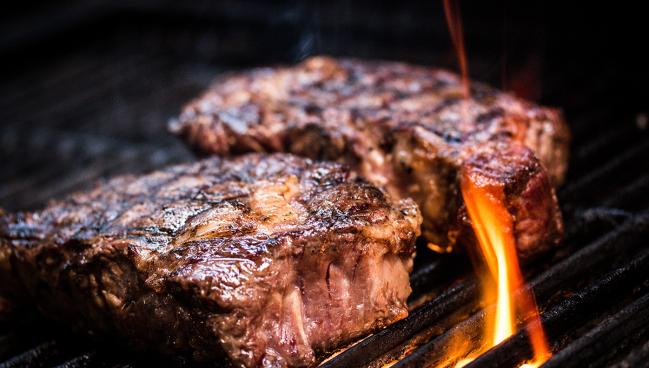Meat Consumption and Gut Microbiome Linked to ASCVD Risk
With further research, it’s possible that interventions might target TMAO and other metabolites to reduce risk, experts say.

New research exploring the mechanism linking cardiovascular disease with red meat consumption supports the idea that gut microbiome-related metabolites may play an active role in risk.
“We found really no mediation by blood cholesterol levels, and that's something that might be surprising because that's what we've been told for 30 years: that you should avoid red meats because of cholesterol,” senior author Dariush Mozaffarian, MD, DrPH (Tufts University, Boston, MA), told TCTMD. Instead, researchers found that inflammation, blood glucose, and novel gut microbiome-related metabolites, including trimethylamine N-oxide (TMAO) and others, were to blame, he said.
Other studies had shown a link between TMAO and higher mortality in PAD patients as well as higher MACE in ACS patients and, more generally, that red meat consumption is associated with worse CVD outcomes.
The new paper, published online Monday in Arteriosclerosis, Thrombosis, and Vascular Biology, is the first to put it all together, said Mozaffarian. “This study looks at the interplay, which I think is what’s unique, in that it is trying to understand if animal sourced food consumption is associated with risk, and if so, how much does TMAO and other related gut microbiome-related metabolites mediate that risk.”
To TCTMD, J. David Spence, MD (Robarts Research Institute/Western University, London, Canada), who was not involved in the study, stressed that “diet is way more important than we think and diet in the US is way worse than everybody thinks. There's a huge opportunity here. It's useful to point out that meat is bad for people.”
Lu Qi, MD, PhD (Tulane University School of Public Health and Tropical Medicine, New Orleans, LA), also commenting on the results, told TCTMD in an email that “the data suggest TMAO metabolites may be one of the pathways linking red meat intakes and CVD.” Moreover, he added, these could be “potential targets for clinical treatment to lower CVD risk.”
However, studies of interventions targeting TMAO metabolites will be needed to establish causality, Qi added.
More Meat, Greater Risk
For the study, Meng Wang, PhD (Tufts University), Mozaffarian, and colleagues looked at animal source foods intake and TMAO-related metabolites in 3,931 American adults age 65 years and up over a median 12.5 years.
After adjustment for baseline differences, those with higher consumptions of unprocessed red meat (adjusted HR 1.15; 95% CI 1.01-1.30), total meat (adjusted HR 1.22; 95% CI 1.07-1.39), and animal source foods (adjusted HR 1.22; 95% CI 1.07-1.39) had higher risks of ASCVD over time. TMAO metabolites mediated these risks by 10.6%, 7.8%, and 9.2%, respectively.
Interestingly, processed red meat intake was only associated with a nonsignificant trend toward higher ASCVD risk (adjusted HR 1.11; 95% CI 0.98-1.25). There were no associations seen with ASCVD risk and consumption of fish, poultry, and eggs.
Additionally, while blood glucose, insulin, and C-reactive protein significantly mediated the relationship between ASCVD risk and total meat consumption, blood pressure and blood cholesterol did not.
Don’t Dismiss Cholesterol
Spence cautioned against interpreting the results to mean that the saturated fat and cholesterol in animal source foods don’t contribute to cardiovascular risk. “Diet isn't about fasting lipids,” he told TCTMD. “The cholesterol level that you wake up with in the morning has very little to do with what you ate yesterday. It's mostly produced overnight by your liver. But for 4 hours after a high cholesterol and high fat meal, you have arterial inflammation, endothelial dysfunction, and increased oxidative stress.”
The study is important, Spence continued, “because it emphasizes that there's more to the harm from meat than just cholesterol and saturated fat.”
The understanding of most clinicians and nutritionist does not include this important fact: red meat kills and processed red meat kills faster. Kim Allan Williams Sr
Commenting on the findings, Kim Allan Williams Sr, MD (University of Louisville School of Medicine, KY), said the data are unsurprising given the current literature. “However, in my view, it's far more important to emphasize this because the understanding of most clinicians and nutritionists does not include this important fact: red meat kills and processed red meat kills faster, if peer reviewed literature is to be believed,” he told TCTMD in an email.
“Moreover, the entire industry surrounding red meat production is reported to be far more damaging to the planet than carbon emissions from our automobiles,” Williams added. “Taken then to this logical extension, this research applied to nutrition guidelines could help save the planet.”
‘More to This Than TMAO’
Mozaffarian said the future implications of this study relate to how clinicians can guide their patients’ decisions about diet.
“We need to better understand why red meats are linked to cardiovascular disease and then try to understand how to reduce that risk,” he said. “People like to eat red meats, so if we want to be able to eat red meats in moderation but also lower our risk, we should really understand what the mechanisms are. And in addition, if part of this is related to the microbiome and these microbiome-related metabolites, could these be new targets for other interventions that could reduce these metabolites in the microbiome?”
Specifically, Mozaffarian would like to see future studies look at whether it's heme iron that is causing the inflammation “or if it's the carnitine that's being converted to TMAO and to γ-butyrobetaine and crotonobetaine.” If it’s the latter, “then telling Americans to focus lean meats to reduce their risk may not be based upon on the evidence,” he said.
“Secondly, we need to better understand how the microbiome is involved in risk,” Mozaffarian said. “Because what if it's people with certain microbiome bacteria and not others? Does this have implications for personalization? . . . If you have a happy gut microbiome, maybe that risk could be reduced.”
If people are at a high risk of strokes and heart attacks, they need to not think of changing their diet as a punishment. J. David Spence
Spence agreed that more work looking at the gut microbiome could unlock some answers in this space. He’s currently working on a study of fecal microbial transplants from people with multiple risk factors and normal arteries—the “protected phenotype”—into those with no risk factors and diseased arteries—the “unexplained phenotype”—to see if their intestinal microbiome makeup can be changed to reduce the levels of toxic metabolites.
“Then we'll be able to figure out which are the good bugs that could replace the bad bugs so people don't make the bad metabolites, and that could be put into [something] like a probiotic,” Spence said.
Ultimately, “I think there's more to this than TMAO,” he added.
In the meantime, Spence encouraged physicians to promote less animal source food consumptions in their patients, especially those at high risk. “If people are at a high risk of strokes and heart attacks, they need to not think of changing their diet as a punishment,” he said. “They need to figure out how to have fun learning how to make it tasty and enjoyable because it's terribly important.”
Yael L. Maxwell is Senior Medical Journalist for TCTMD and Section Editor of TCTMD's Fellows Forum. She served as the inaugural…
Read Full BioSources
Wang M, Wang Z, Lee Y, et al. Dietary meat, trimethylamine N-oxide-related metabolites, and incident cardiovascular disease among older adults: the cardiovascular health study. Arterioscler Thromb Vasc Biol. 2022;Epub ahead of print.
Disclosures
- The study was funded by the National Heart, Lung, and Blood Institute, with additional support from the National Institutes of Health, the National Institute of Neurological Disorders and Stroke, and the National Institute on Aging.





Comments